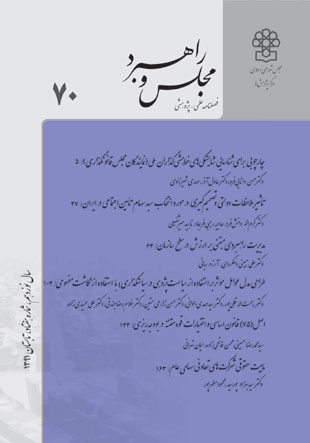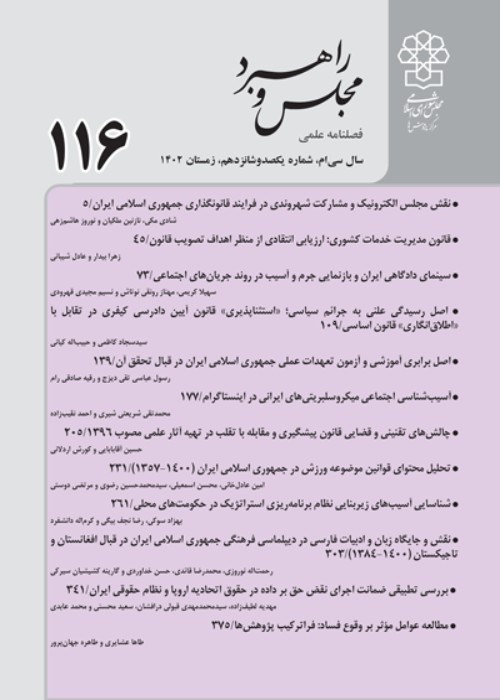فهرست مطالب

فصلنامه مجلس و راهبرد
پیاپی 70 (تابستان 1391)
- تاریخ انتشار: 1391/04/04
- تعداد عناوین: 6
-
-
Page 5Nowadays, a significant part of decisions related to public policy is made in an institution called as parliament. In fact, parliament is the most basic institution in field of policymaking in all political systems and therefore, it is very important that individuals which are to make policy on behalf of people need to have attributes, credentials and qualifications. Challenge is that despite great developments in the Islamic Republic of Iran’s policy making, policies made in the Majlis always face deficits and shortages and lacks a comprehensive approach and adequate reflections or are at odd with system’s general policies. Reason, it seems, is the lack or inadequacy of MPs’ qualifications. Appropriate solution is lies in enhancing MPs’ and national policy makers’ qualifications. In doing so, there will be certainly an effective parliament. This paper attempts to identify national policy makers’ qualifications and having analyzed data drawn from questionnaire, concludes that there are meaningful differences between the existing situation and the desired situation. In the end, some recommendations are proposed in order to enhance and institutionalize credential among national policy makers.Keywords: Public Policymaking, MP's Qualifications, Islamic Republic of Iran, Technical Qualifications, Social qualifications, Interactional Qualifications, Political Qualifications, Personal Qualifications, Perceptual Qualifications, Value Qualifications
-
Page 37This study examines effect of the decision-making and governmental considerations regarding the choice of Social Security Organization’s portfolio in Iran (Social Security Investment Company [SHASTA]) in light of vector regression approach. This study aims to examine effect of the governmental considerations on increase in governmental debt to Social Security Fund and its impact on Social Security Investment Company’s portfolio risk in exchange for redeeming debts. Descriptive method and survey was used to collect data. Measuring the data validity was done through interviewing with academicians and practitioners and measuring the data reliability was done through Cranach’s Alpha Model. Statistical population in this study is Social Security Investment Company. Experts working in Investment and Economic Affairs Unit within this company have been selected as a statistical sample. The number of experts is 30, all of which are sampled according to institutional circumstances. In order to analyze data drawn from the questionnaires, Spearman’s correlation coefficient test as well as vector regression, in which all variables are seen as endogenous and don’t rely on any particular economic theory does not rely is used. This study’s findings suggest that governmental considerations and in fact redeeming governmental debts to the organization through giving shares regardless of paying attention to risk calculations as well as expertise will increase portfolio risk and ultimately, reduce profitability.Keywords: Governmental Considerations, Risk, Portfolio, Shares, Social Security Fund, Investment, Stock Market
-
Page 63Given to increasing complexities and environmental changes in contemporary competitive world, style of management within organizations has gone through significant changes, and in this framework, has experienced three periods: (1) management by instructions (MBI); (2) management by objective (MBO); and (3) management by value (MBV). Moreover, another development happened in modern management concerns with relation between organization and environment (according to strategic management) which has increasing received scholars attention. According to this approach, key question is that “in state of turbulence and environmental predictable and unpredictable transformations, how organizations must survive and expand their activities?” This paper seeks to study the evolution of management and the quality of change in style of management towards MBV and to explain values’ philosophical foundations as well as their relevant intellectual schools, and in doing so, focuses on strategic and in-between values. Therefore, a mixed research method is used and qualitative as well as quantitative findings simultaneously are analyzed. This paper’s innovation is that it seeks to introduce a conceptual model for studying organizations (a case study on a big financial organization) as a model of management based on underlying values which involves issues such as structure, strategy, culture and style of management.Keywords: Philosophical Schools on Values, Management by Value, Levels of Values, Value, based Strategic Model
-
Page 103Policy research is process of doing research about or analyzing a social issue in order to propose policymakers with some practical recommendations. Utilizing policy research is important than of doing it. Utilization occurs when policy research affect, shape or change people or systems. This article aims to identify factors influencing on the utilization of policy research and to design them within a model. In doing so, a sequential-exploratory mixed method is used. In order to identify factors, literature review, interview and focus group are used. In order to design a model, conceptual mapping is used. Statistical population is teachers and researchers in the field of public policymaking. In different stages of multi-level sampling, sequential-Purposive method is used. In sum, 36 people have participated in this research (10 people in stage of interview, 7 people in stage of focus group and 19 people in stage of designing model). Finally, 94 factors within 18 components and 4 dimensions were identified. This article s results support “classification of factors” and show that there is consensus mostly over research itself, policymaker and idiosyncrasies of researcher, and contextual dimension, which freedman s test has supported this ranking.Keywords: Policymaking, Policy Research, Concept Mapping, Utilization of Policy Research
-
Page 133The role of legislative branch in the budgeting process varies in different countries. This difference sometimes is attributed to countries’ governmental structure. The constitution, which in fact is manifestation of political structure in all countries, determines structure and function of different branches and institutions. In the budgeting process, in turn, law has determined tasks and functions of different branches. Thus, legislative branches can be divided in three categories in term of their role in the budgeting process: (1) Parliaments of limited powers in the budgeting process; (2) Parliaments of unlimited powers in the budgeting process; and (3) Parliaments of the balancing powers in the budgeting process. Studying the Iranian Constitution shows that Iranian legislature can be categorized as a institution that have power to balance the budget. Thus, although Iranian Parliament has a general power to enact; according to articles 75 and 52 of Iranian Constitution, this power faces major limitations. First, called as general limitation, is necessity of consistency of statutory laws adopted by parliament with the Holy Shariah and the Constitution. Secondly, applied to budget, some limitations has been outlined in articles related to budget in the Constitution. Meanwhile, article 75 is of more importance, which is related to the principle of “balance in the budget”. In other words, the Majlis can not change public income and expenditure so that interrupts the Budget Act. The Guardian Council, in comparatively commenting on proposals by MPs, only is charged with ensuring the seeming compatibility of the legislation passed by the Majlis with the Constitution because it doesn’t have necessary economic means. Therefore, in many cases, it is unclear whether estimated resources are sufficient for paying for costs related to proposals - which if not, an imbalance within budget may follow.Keywords: Budgeting, Legislative Powers, The Principle of Balance in the Budget, Economic Analysis on Law
-
Page 163Notice 1384/3/1by the supreme leader of Islamic Republic of Iran regarding the systems general policies related to article 44 of the Constitution which aims to provide social justice enhance productivity, redistribute wealth, eliminate poverty, and increase competitive power in national economy, led Economic and legal system’s rigid framework to change the foundation rather than to moderate and adjust. Contrary to the prevailing conception which act on how to implement policies related to article 44 is seen as a economic act, significant parts of this act deal with legal infrastructure and its framework is a structural formulation in sphere of commercial system and thus, has greatly influenced the overlooked firm’s law, specially stock and cooperative firms. One of institutions which have been mentioned in this act is joint stock cooperative firm, which has been unprecedented in Iranian legal system. In this framework, having described different views about nature of this legal institution and mentioned properties as well as distinction between it and cooperative and stock firms, this paper concludes that legal nature of this firm is different from firms outlined in article 20 of commercial law. On the other hand, it is different from conventional cooperatives and thus we have to consider such firms as having new and mixed legal nature.Keywords: Joint Sock Cooperative Firm, Commercial Firms, Conventional Cooperative Firms, Country, wide National Cooperative Firms, Stock Firm


